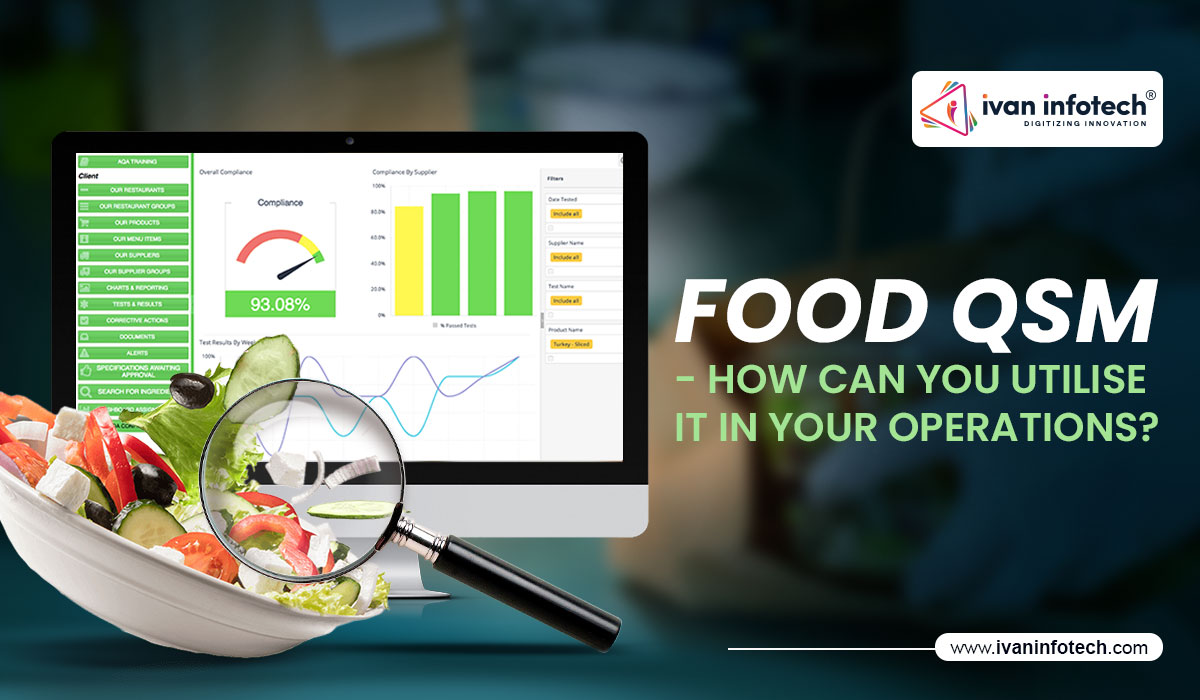
Maximizing Efficiency with Food QSM
As a result, food quality and food safety are intertwined, but also complex. Efficacy and effectiveness both necessitate the implementation of standards. Management systems that help companies achieve their goals are known as quality management systems. In order to create processes that produce consistent, safe, and uniform products, make use of ISO standards and TQM.
Food QMS encourages businesses to become proactive rather than reactive in response to inspections. To ensure that any deviation from industry standards is promptly corrected, QMS software gathers data and sends notifications in real-time. Remediation of non-compliant processes is time- and money-intensive if left unattended. If a company does regular inspections, this approach will never be as responsive and agile as implementing FQMS solutions in food and beverage software development that encourage continuous improvement.
Purpose of QMS in the Food Industry
A plant’s quality and compliance can be seen and tracked through the use of software with a user-friendly dashboard and a variety of ways to generate data-based reports. Traditional management software cannot match the flexibility of QMS solutions integrated into food and beverage software solutions, which can be customised to meet the specific needs of each food and beverage company. For instance, they might have the following characteristics:
- The capacity of data retrieval in real-time from several sources including PLCs, scales and thermometers.
- Data and time-stamped data collection for audit.
- Fast verification against a series of programs including customer quality requirements, safety protocols, regulatory measures and more.
- Introduction to supplier management tools including notifications and vendor portals.
- Traceability and tracking of KPI with the help of analytics to get a more focused view of tasks and food safety.
How Cloud-based QMS work?
With cloud-based, real-time solutions, manufacturers can significantly increase their bottom lines.
Internally and across the industry, quality management software like this is critical to meeting product specifications consistently.
Quality management in food and beverage software solutions can be used by manufacturers to ensure the quality of their products. Manufacturers need this data on a daily basis to ensure that their products are ready to ship with cloud-based, digital quality management solutions.
Using cloud-based data, manufacturers can access real-time information about all of their processes, lines, and plants at any given time.
Complying with regulations is made easier by having that information at hand.
- Collection of data and compliance with sampling
- Monitoring product quality
- Control of the net content
- Food or product safety
- Best Manufacturing Practice
- Validation of Process
This kind of accessibility is also useful for audits. Leaders can quickly access all quality and process data thanks to a cloud-based database. It also provides the ability to conduct in-depth analyses of product, line, and shift data, as well as the ability to customise reports to meet specific needs.
The ability to track down and stop defective shipments is another benefit of cloud-based quality management in food and beverage system software solutions. They also assist manufacturers in locating products that are out of specification down to the batch level. Recalls and scrap can be reduced by doing this.
In the end, digital software solutions help manufacturers keep track of product compliance on a regular basis. A cloud-based quality management solution helps businesses save money, free up their IT staff, and make their quality data more easily accessible.
Benefits of QMS in the Food and Beverage Industry
Quality is important for all industries and all businesses, but it holds more importance in the food and beverage industry. The Food and Beverage industry is under pressure to meet increasingly stringent quality standards, which must be integrated into all aspects of daily operations. Additionally, they must meet the ever-increasing demands of customers. End-to-end quality management in food and beverage software solution can provide you with the following advantages:
Better Business Processes
With a quality management system for the food industry in place, business processes can be streamlined and quality issues can be avoided. A quality management system (QMS) ensures better control over the major business processes to ensure consistency. As a result, quality and compliance are assured, as is the organization’s compliance with industry best practices. Using the right quality management system, you can align your quality processes with your company’s business goals.
Better Customer Satisfaction
Word-of-mouth is more important in the food and beverage industry than online reviews. Customers’ increasing demands place an even greater burden on businesses to deliver on their promises. Loyalty can only be expressed when a customer is satisfied with the product. Having a quality management system integrated into food and beverage software development ensures that best practices and standards are followed, regardless of whether you’re in the service or product industry. Your customers will feel more secure about the goods and services they are purchasing as a result of this.
Continuous Improvement Plans
Food and beverage companies benefit greatly from implementing a quality management system in food and beverage software solutions because it allows them to standardise their processes and track, monitor, and analyse their results. As a result, you are better equipped to adjust your current procedures. In order to foster a culture of continuous improvement, this procedure will be maintained. Improved quality management processes are made possible by streamlined procedures.
More Employee Engagement
Without the help of your employees, you will not be able to win over new customers. Maintaining a positive work environment is critical for any business. With the help of a food quality management system that is effective, you can do everything from setting expectations to communicating, involving them, and working together. As a result, you’ll be able to identify the need for training to help employees better perform their duties and responsibilities. In doing so, they will feel more connected and engaged with the organisation that cares for them.”
Better Supplier Relationships
Stable relationships with suppliers are essential for maintaining compliance and reducing quality costs. The food and beverage industry faces one of its most significant challenges when it comes to onboarding and managing suppliers. You can also benefit from food and beverage software solutions. In order to avoid any unpleasant surprises, you should make it clear what you expect from them and be as forthcoming as possible about your plans.
Greater Decision-Making
You can store, manage, and share all of your team’s and your management’s important data using a quality management system. As a result, better and more informed decisions can be made for increased organisational efficiency and productivity. To ensure that every action plan implemented can be reviewed, a quality management system ensures traceability through the complex processes. With such a consistent approach, the ability to make decisions keeps getting better.
If you want to implement a quality management system in your food and beverage business, consult a professional who has expertise in offering food and beverage software solutions.
Subscribe to the Newsletter
Don’t lag behind in the ever-evolving age. Stay updated with all tech news and trends. We will not fill your inbox with spam mails. You will only receive updates about the cream contents.
Want Assistance with Software Development?
Anything you need in terms of software, you can count on us. With knowledge, skills and years of experience, we create tailor-made, integrated development solutions with high-end technologies.


Categories
Ai software solution
API Development Services
app development
Application Maintenance
AR And VR Software Development
AR Software Development
Artificial Intelligence
Asset Tracking
Automated system
Big Data
Block Chain Development
Blockchain Development Solution
cloud computing solutions
CMS Development Services
Construction Software Solution
CRM
custom web application
Digital Asset Management
Digital Marketing
Digital Services
Ecommerce Industry Solutions
ecommerce solution provider
Education Software Development
education software development Solution
Education Software Solution
ERP Software Development
Event Ticketing Software Solution
Finance Software Solution
Food and beverage software
Graphic Design
Healthcare software solution
hospitality software development solutions
hotel software solution
IMS
IOT
IT application development
IT Consultancy
IT services
IT solutions
Java
Java App Development
Lead Generation Services
Legal Software Development
mobile app design
opensource software development
pos software development Solution
Quality Assurance
Real estate software
Restaurant Software Solution
Retail IT Solutions
Retail Management Software
software development
Software Security
Software Testing
Sports Software Development
Supply Chain Software Solution
Transportation Software Development
Travel & Hospitality
UI and UX design
Uncategorized
Web Design
Web development service
Web Programming